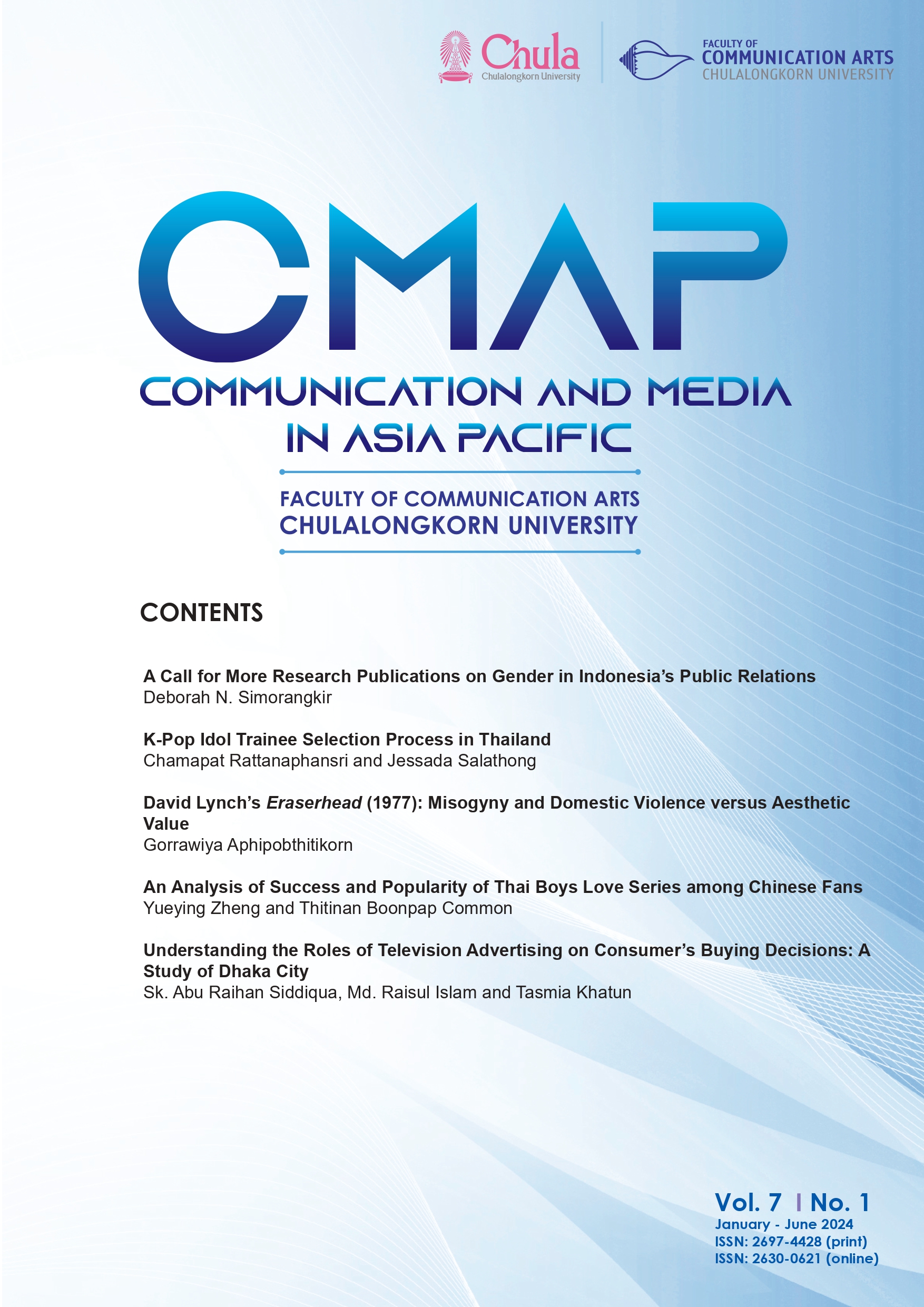An Analysis of Success and Popularity of Thai Boys Love Series among Chinese Fans
Main Article Content
Abstract
The Thai Boys Love series has gained popularity since the 2010s, notably in China. Chinese fans have demonstrated their ability to popularize the Thai Boys Love series by translating and reediting the material, viewing the related content. This research aims to examine the success and popularity of the Thai Boys Love series among Chinese fans, and to analyze Chinese fandom and fan economy. In terms of methodology, this research used two qualitative methods that included textual analysis on the text of two series, I Told Sunset About You and KinnPorsche the Series, and focus group discussions with two groups of 8 to 9 participants aged between 16 and 26. The investigation has revealed the significance of the series' settings, Chinese elements, and the plot's color and tone settings. Moreover, the most significant elements influencing their choices are gorgeous scenery and attractive story settings. Based on the discussion, there are several suggestions for both Thai media producers and the Thai creative industry stakeholders.
Article Details
References
Boonchutima, S., & Lou, R. (2022). Relationship between Chinese viewers’ attitude toward fansub videos and attitude against sponsorship. Cogent Education, 9(1), Article 2102481. https://doi.org/10.1080/2331186X.2022.2102481
Duffett, M. (2013). Understanding fandom: An introduction to the study of media fan culture. Bloomsbury.
Gao, Q., Abel, F., Houben, G.-J., & Yu, Y. (2012). A comparative study of users’ microblogging behavior on Sina Weibo and Twitter. In J. Masthoff, B. Mobasher, M. C. Desmarais, & R. Nkambou (Eds.), User modeling, adaptation, and personalization. Heidelberg.
He, T. (2014). Fansubs and market access of foreign audiovisual products in China: The copyright predicament and the use of No Action Policy. Oregon Review of International Law, 16, 307.
Hills, M. (2003). Fan cultures. Routledge.
Jenkins, H. (2006). Convergence culture. New York University Press.
Prasannam, N. (2019). The Yaoi phenomenon in Thailand and fan/industry interaction. Plaridel, 16(2), 63-89. https://doi.org/ 10.52518/2020.16.2-03prsnam
Sun, M. (2020). K-pop fan labor and an alternative creative industry: A case study of GOT7 Chinese fans. Global Media and China, 5(4), 389-406. https://doi.org/ 10.1177/2059436420954588
UNCTAD. (2010). Creative economy report 2010. https://unctad.org/system/files/official-document/ditctab20103_en.pdf
Wang, D. (2017). Fansubbing in China–With reference to the fansubbing group YYeTs. The Journal of Specialised Translation, 28(2017), 165-188.
Yang, F., Liu, Y., Yu, X., & Yang, M. (2012). Automatic detection of rumor on Sna Weibo. Proceedings of the ACM SIGKDD Workshop on Mining Data Semantics,
Zhang, C. Y., & Dedman, A. K. (2021). Hyperreal homoerotic love in a monarchized military conjuncture: A situated view of the Thai Boys’ Love industry. Feminist Media Studies, 21(6), 1039-1043. https://doi.org/10.1080/14680777.2021.1959370
Zhang, J. (2021). The reception of Thai Boys Love Series in China: Consumption, imagination, and friction. Zotero.
Zubernis, L., & Davis, K. (2016). Growing pains: The changing ethical landscape of fan studies. The Journal of Fandom Studies, 4(3), 301-306.


